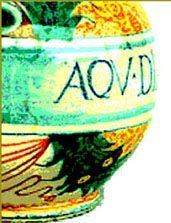| |
|
|
| |
|
|
| |
| Crèdits / Crédits / Credits |
|
|
|
|
|
METODOLOGIA DOCENT |
|
|
|
|
|
|
|
|
RESOLUCIÓN DE CASOS DE SEGUIMIENTO FARMACOTERAPÉUTICO: ¿UN RECURSO DIDÁCTICO ADECUADO PARA UN APRENDIZAJE INTEGRADOR?
|

|
|
|
|
Recio, MC; Ubeda, A; Ferrándiz, ML; Noguera, M A; Maria Amigó, M; D’Ocón, P; Ivorra, MD. |
|
|
|
|
RESEÑA |
|
|
En la Universitat de València la docencia teórica-práctica en Atención Farmacéutica se incluye en el programa de la materia troncal “Farmacología y Farmacia Clínica”, que se imparte en el segundo ciclo de
la Licenciatura de Farmacia. Una de las sesiones prácticas basa el aprendizaje en la resolución de casos de
Seguimiento Farmacoterapéutico (SFT). Dicha actividad permite evaluar: 1) Grado de formación a través
de la integración de los conocimientos teóricos en Farmacología. 2) Actitud y capacidades adquiridas y 3)
Aceptación por parte de los estudiantes. Tras la descripción de las distintas fases del SFT, se ven ejemplos
de casos clínicos donde detectar los resultados clínicos negativos de la medicación. Por último, se
distribuyen nuevos problemas que los estudiantes tendrán que resolver y exponer oralmente en otra
sesión. Así, los estudiantes perciben cuales son sus necesidades formativas para realizar correctamente un
SFT y se familiarizan con las diferentes fuentes de información de medicamentos. La solución propuesta
nos permite valorar su capacidad para tomar decisiones, así como su actitud y grado de participación. El
90% de los estudiantes califican de buena o excelente esta actividad. Por nuestra parte, consideramos que
la resolución de casos de Seguimiento Farmacoterapéutico es fundamental para el estudiante. |
|
|
|
|
|
REVIEW |
|
|
At the University of Valencia, the teaching – both theoretical and practical – of pharmaceutical care is
included in the core course “Pharmacology and Clinical Pharmacy,” which is given in the second stage of
the Pharmacy degree. One of the class activities involves the solution of real pharmacotherapy (PT)
follow-up problems. This activity not only allows teachers to evaluate This activity not only allows
teachers to evaluate the students’ ability to apply pharmacological theory to practical problems, but also
their acquired knowledge of and attitudes towards PT in general. It also allows students to understand the
usefulness of theory in the course and in practice. Thus, after a short description of the various PT phases,
different clinical situations are presented in which the students must detect and solve drug therapy
problems. At the end of the session, new problems are proposed for the students to solve. Their solutions
are expounded orally in a subsequent class. In this way, students begin to understand the type of
knowledge and background they need in order to carry out PT successfully while also becoming
familiarized with various drug information sources. Their subsequently proposed solutions allow their
teachers to evaluate not only their ability to make decisions, but also their attitude towards the subject and
their degree of participation in the course. Typically, 90% of the students rate this activity as good to
excellent. We thus consider this PT-based learning to be fundamental for the students. |
|
| |
 |
| |
tornar al sumari |
|
|



